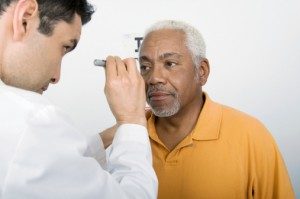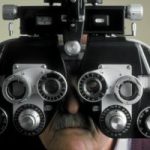 Our eyes are our windows to the world, which is why we should take care of them the best we can. Unfortunately, approximately 29 million Americans age 20 and older have a metabolic disease called diabetes increasing their risk for vision loss and other health problems. To help spread awareness, November has been designated Diabetic Eye Disease Month, and we at Bel Marra want to do our part to spread information to encourage our readers to seek treatment for vision problems related to diabetes.
Our eyes are our windows to the world, which is why we should take care of them the best we can. Unfortunately, approximately 29 million Americans age 20 and older have a metabolic disease called diabetes increasing their risk for vision loss and other health problems. To help spread awareness, November has been designated Diabetic Eye Disease Month, and we at Bel Marra want to do our part to spread information to encourage our readers to seek treatment for vision problems related to diabetes.
To help you understand the eye-related diseases, we have compiled a list of our best articles on the subject. You will find information on diabetic retinopathy, age-related macular degeneration, and other causes of vision loss.
Diabetic retinopathy eye disease causes, prevention, and treatment
Advertisement
Diabetic retinopathy is an eye disease experienced by those with diabetes. Unmanaged diabetes can cause complications to the blood vessels of the light sensitive tissue in the back of the eye – the retina. Diabetic retinopathy in its early stages may be symptomless and only mild vision impairments may be noticed. This can be confused with aging and is often overlooked. Over time, if left untreated, diabetic retinopathy can result in blindness. Continue reading…
 Diabetic retinopathy-induced vision loss can be blocked with anti-inflammatory molecule: Study
Diabetic retinopathy-induced vision loss can be blocked with anti-inflammatory molecule: Study
Vision loss in diabetic retinopathy patients can be prevented with an advanced version of an anti-inflammatory molecule present in our body. Diabetic retinopathy is the leading cause of vision loss in diabetics as high levels of glucose damage the nerves behind the eyes. Scientists have developed a man-made version of soluble gp130, or sgp130, that is 10 times more powerful than the natural one. This “upgraded” molecule can reduce inflammation in the eyes as a result of diabetes. Continue reading…
 Diabetics with obstructive sleep apnea at increased risk of blindness: Study
Diabetics with obstructive sleep apnea at increased risk of blindness: Study
Type 2 diabetes is a serious metabolic condition with a multitude of negative side effects. One of the leading causes of type 2 diabetes is obesity, and many obese individuals also suffer from obstructive sleep apnea (OSA), a potentially dangerous disorder that causes breathing to repeatedly stop and start during sleep.
A new study into patients who have both conditions has found an increased risk for the development of another condition called diabetic retinopathy, which leads to blindness. Continue reading…
 Exercise reduces the risk of vision problems in diabetics
Exercise reduces the risk of vision problems in diabetics
Advertisement
A new study has found that staying fit and regularly exercising can reduce the risk of vision and eye problems in diabetics. Vision problems are often a complication of diabetes, especially if it’s not well managed. The study found that diabetics who stay inactive have a higher risk of vision problems, compared to those who partake in physical activity.
The most common cause of vision loss in diabetics, diabetic retinopathy “involves changes to retinal blood vessels that can cause them to bleed or leak fluid, distorting vision,” according to the U.S. National Eye Institute. Continue reading…
 Guidelines to treat diabetic retinal degeneration, along with age-related macular degeneration
Guidelines to treat diabetic retinal degeneration, along with age-related macular degeneration
New guidelines have been laid out to treat diabetic retinal degeneration, along with age-related macular degeneration. The study compared the efficiency of various drugs in treating diabetic macular degeneration. Ursula Schmidt-Erfurth, director of the University Hospital of Ophthalmology and Optometry at MedUni, Vienna, explained, “The Vienna Reading Center is one of the leading centers in the world for analyzing images of the human retina. Our analyses and studies will also form a basis for the approval of new drugs. Diabetics are particularly reliant on having normal vision, even if it is just to adjust their blood sugar on an everyday basis.” Continue reading…
